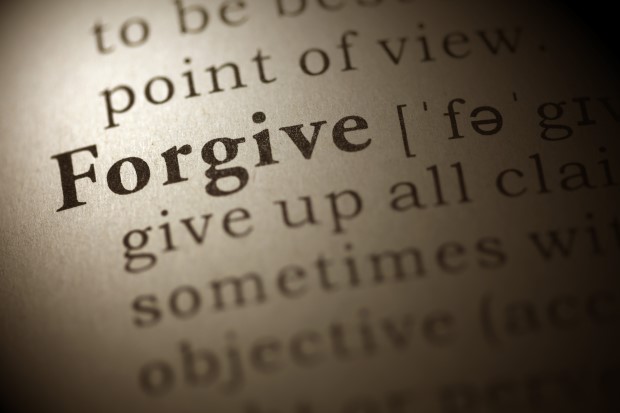
Although everyone is familiar with the concept of forgiveness—the act of no longer feeling anger or resentment toward someone—it can be extremely difficult to understand, let alone practice. We really don’t know how to deal with it; we’ve never been taught. Many times people make an effort to forgive someone, but then as soon as a bad memory arises, the resentment comes back and forgiveness goes right out the window.
A Spiritual Being Having a Human Experience
So why is it so hard to do? I know when I was struggling to forgive the man who murdered my grandmother I used to get annoyed with people telling me to ‘just let it go’. I really wanted to be passed the pain and the hurt it was causing me but I was confused and stuck by the ‘How’. In society and religious institutions we are encouraged to ‘forgive and forget’ or ‘let go and let God’, it has become the new mantra of emotional health and well-being. Of course, forgiveness is one of the most beautiful and loving experiences anyone can have. I can attest to that when it happens authentically.
I believe we are spiritual beings having a human experience, that’s the point – a ‘human experience’. To live a spiritual life, if we so choose it, involves the emotional healing we as a society are so keen to avoid or deny.
The truth is when people do things to hurt you; you feel it physically and emotionally. To ignore it and stuff it away or pretend to be some shining light of spiritual forgiveness when all you really want to do is feel the hurt will actually hurt you more. By “BE-Friending” our wounding we actually create space for authentic true forgiveness bringing in peace and positive energy.
Forgiveness is a Skill
Forgiveness seems almost unnatural. Our sense of fairness tells us that people should pay for their wrongs. The primal parts of the brain are wired to keep us feeling safe and protected. That is why sometimes seeking revenge on another feels good. But the brain is also hardwired for connection and compassion, which is forgiveness’s ally.
Did you know that forgiveness is a learned skill? We just don’t know how to do it automatically. It is a process that takes time and needs to be understood. Just like grieving after a loss, forgiveness also has its stages we all need to deal with until we reach that act of love and the place of inner peace.
Perhaps the hardest thing about practicing forgiveness in daily life is that it requires us to confront the reality of our feelings toward those we know best. It is difficult enough to forgive a stranger we might never see again, but it is much more difficult to forgive a person we love and trust. This could mean that you’re still denying your unconscious anger and resentment. So even though you think you’ve come to terms with what happened, there are still emotions about the event that you have pushed out of awareness.
True Forgiveness Integrates the Mind, Body and Soul
In fact, many people can get caught up in premature forgiveness as a way to avoid coping with all the unpleasant emotions they would rather not examine. Many of us claim to have forgiven while still holding toxic emotions below the surface of awareness. We really live if we’re not emotionally real and thus we practice ‘pseudo-forgiveness’.
The important thing here is to listen to your body. This is where the emotions “hide out” and why we might not like to feel them. Not learning to deal with our emotions in healthy ways hinders us. This slows the healing process needed before we can actually walk down the path of forgiveness. Authentic, true forgiveness is the result of a genuine healing process, a real working through of our memories and feelings around certain events and relationships.
Did you know that true forgiveness is something that only your body can do? Anger and resentments are held in the body as well as the mind. Your mind can decide to let go and forgive long before your body is ready. Therefore, true forgiveness requires both an emotional and physical release to be complete. That release leads to more love and joy in your life. As long as those emotions, such as anger, are brewing secretly in the subconscious, genuine forgiveness remains impossible.
Finally, if forgiving is going to work and be true, then your heart needs to be open to the experience. If you are not willing to be humble and vulnerable, your forgiveness will never be more than a fruitless gesture. Forgiving is a deeply personal matter. Ultimately each of us must find healing within, on our own terms and in our own time. It’s a struggle. It is not something you just wake up one morning and decide to do. There is no magic pill; you have to work through your anger and hurt. You have to try to make each day a little better than the day before. In order to find your ticket to freedom, happiness and inner peace, it takes three things to propel you on your path:
1. Honesty with yourself – it takes courage to look deep within and take responsibility for your choices and actions.
2. Willingness to heal the pain associated with the situation – No matter how hard we might try to deny certain emotions within by avoiding looking at them they are still there. When we embrace our emotions and work through them it is the beginning of our healing and movement to letting go of the past. We empower our soul.
3. Acceptance – We can’t change the past, but when we accept that we can heal, let go and not allow it to affect our future.
It is in freeing ourselves that our energy level rises; our consciousness rises, and, in doing so, those around us benefit too.



